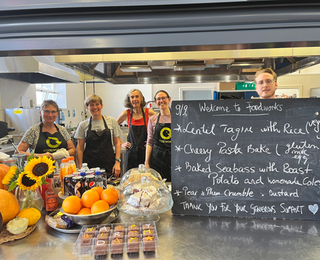Food Works intercepts food waste and distributes it to local people on contribute-what-you-can-afford basis through its market, cafes, and ready meals.
Key information
-
Focus area
Social lending -
Investment type
Enterprise debt -
Region
Yorkshire and the Humber
-
Challenge:
Food waste is the third biggest producer of carbon emissions on the planet after the USA and China. WRAP data shows that 200,000 tonnes of edible food is wasted in the supply chain every year.
What’s more, the cost-of-living emergency has resulted in many struggling to afford necessities including food. For example, between February and April 2022 there was an increase of £1.51 between the same food items.
-
Approach:
Food Works Sheffield intercepts food waste from businesses and producers and distributes it to local people through its market, cafes and ready meals services. All ready meals and market boxes made from the surplus food are sold on a Pay What You Can Afford basis with a minimum contribution of £1.
Food Works offers a community farm to help grow locally sourced produce. It is also now a central community space: allowing people from across the city to support one another through volunteering opportunities and events.
-
Revenue Model:
Food Works generates income from sales of its ready meals and food boxes on a minimum contribution of £1. This model means people can contribute more at certain times of the year can help provide food for those who are less able to do so.
-
Impact:
Food Works Sheffield intercepts 500 tonnes of food waste every year, and provides millions of sustainable meals across the city. It also compares to a forest of 50,000 trees in terms of its carbon impact. It serves more than 5,000 people every month across its cafes and market - a number which continues to grow.



